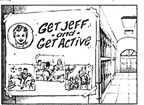
題目列表(包括答案和解析)
| A.變化 | B.排列 | C.調(diào)整 | D.減少 |
| A.reading, writing, sports, history, and science. |
| B.reading, art, arithmetic, history, and geography |
| C.reading, writing, arithmetic, history, and geography |
| D.reading, physics, chemistry, history, and geography |
A. | B. |
C. | D. |
| A.try the food in the late 19th century |
| B.learn the subjects over a century ago |
| C.memorized and retell their lessons they have learn |
| D.experience the way children learned over a century ago |
| A.They had only one teacher. |
| B.They had different classrooms. |
| C.They could choose the seats they liked. |
| D.They learned more subjects than we do now. |
| A.In 2008. | B.In 2009. | C.In 2010. | D.In 2011. |
| A.The fruit will rot or be eaten by small animals. |
| B.People who need the fruit will come to pick it. |
| C.The fruit will be used as a resource for research. |
| D.Homeowners will pick the fruit and sell it. |
| A.資源 | B.調(diào)查 | C.對策 | D.娛樂 |
| A.It’s interesting and easy. | B.It’s meaningless and hard. |
| C.It’s meaningful and exciting. | D.It’s tiring and boring. |
Kelly Christopher, a student at Lutheran High School in California, US, loves oranges. One day last week, she used a pole(竿子) to pick oranges off trees and collect them in baskets. It’s the first time in her 15 years she’s picked fruit from trees.
"This is quite different from buying oranges in the supermarket," said Christopher. "Every time I eat an orange, I’ll remember this experience."
Christopher was one of the 30 student volunteers at Soil Born Farms. She volunteered as part of a project which was set up in 2009 to help homeowners in South Land Park pick oranges and other fruits out of their backyards. Before, the fruit would rot on the ground or get eaten by animals. Now the fruit is donated to those who need it.
"It is good for many people", said Randy Stannard, who works for the project. "The homeowner gets fruit picked and more people can have healthy food."
"Two harvests (收成 ) were organized in 2009 and volunteers picked 3,000 pounds (1,360kg) of fruit", Stannard said. In 2010, the number was 20,000. This year, Soil Born Farms hopes to get 40,000 pounds. They will harvest every weekend from January to April.
Shannon Galloway, Christopher’s science teacher, brought her students into the project this year.
"You’re making use of a resource that might be wasted," she said. "I think it’s meaningful to everyone."
Donato Frazier, 15, always climbs up a ladder(梯子) and gets on the top of the tree.
"Standing on the treetop is pretty cool," Frazier said. "I can see clearly that many baskets are filled up, and even see that many people are eating healthy fruit because of our volunteer work."
71. Christopher and other students went to pick fruits from real trees because they wanted to _____.
A. have some fresh fruit for themselves B. make some money by selling fruit
C. provide people with more healthy fruit D. buy some cheap fruit from their neighbors
【小題1】 When was the project set up?
| A.In 2008. | B.In 2009. | C.In 2010. | D.In 2011. |
| A.The fruit will rot or be eaten by small animals. |
| B.People who need the fruit will come to pick it. |
| C.The fruit will be used as a resource for research. |
| D.Homeowners will pick the fruit and sell it. |
| A.資源 | B.調(diào)查 | C.對策 | D.娛樂 |
| A.It’s interesting and easy. | B.It’s meaningless and hard. |
| C.It’s meaningful and exciting. | D.It’s tiring and boring. |
| A.In 2008. | B.In 2009. | C.In 2010. | D.In 2011. |
| A.The fruit will rot or be eaten by small animals. |
| B.People who need the fruit will come to pick it. |
| C.The fruit will be used as a resource for research. |
| D.Homeowners will pick the fruit and sell it. |
| A.資源 | B.調(diào)查 | C.對策 | D.娛樂 |
| A.It’s interesting and easy. | B.It’s meaningless and hard. |
| C.It’s meaningful and exciting. | D.It’s tiring and boring. |

| 【小題1】 |
|
| 【小題2】 |
|
| 【小題3】 |
|
| 【小題4】 |
|
| 【小題5】 |
|
| 【小題6】 |
|
| 【小題7】 |
|
| 【小題8】 |
|
| 【小題9】 |
|
| 【小題10】 |
|
| 【小題11】 |
|
| 【小題12】 |
|
湖北省互聯(lián)網(wǎng)違法和不良信息舉報平臺 | 網(wǎng)上有害信息舉報專區(qū) | 電信詐騙舉報專區(qū) | 涉歷史虛無主義有害信息舉報專區(qū) | 涉企侵權(quán)舉報專區(qū)
違法和不良信息舉報電話:027-86699610 舉報郵箱:58377363@163.com